A very special award
Unsung Women Nation Builders 2022
Ever since 2017 we, in collaboration with IPDC, have had the honour of introducing a very special kind of award titled "Unsung Women Nation Builders". For this award we used our network of reporters based throughout the country to search and identify women leaders from remote corners of the country who worked silently and without any recognition to serve the downtrodden and help develop the country through their outstanding social and humanitarian work. We particularly chose women because they mostly remained unrecognised.
In this section of our special supplement, we put all our awardees under one cover to collectively celebrate the work of these exceptional women and hope that it will encourage others – both women and men – to devote themselves in bigger ways in service of the nation. They are placed in reverse order with the latest awardee being mentioned first.
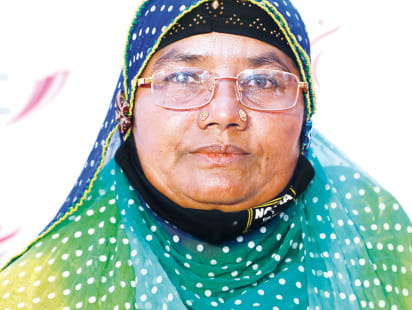
Jamila Begum, Breaking the stereotype of a male-dominated profession
Jamila Begum is breaking the stereotype of a male-dominated profession by earning solvency from butchering cattle in the Birganj upazila of Dinajpur. In an effort to become financially stable after her drunkard husband abandoned her and her children, she took the lead of the business she had set up for her husband and became a butcher herself. Jamila's business is now booming and she not only managed to clear her and her family's long-standing debts but also build a home in her village. She earns around Tk 700-1,000 daily. Besides, her son Jahurul is also helping her at the shop while her daughter Salma studies in grade VIII at Jharbari High School. Initially, she was frowned upon for taking up a male-dominated job as a female. But now the villagers and other male butchers have accepted her. They even come to help her. "Jamila is well-known for her profession in the village. She sells quality meat," said Jakir, a youth of Debarupara.

Takia Sultana Nova, Setting the wheels of change in motion
Takia's journey dates back to her days at Hazera-Taju Degree College. Her college was quite far from her house, and with buses stopping every 10 minutes for passengers, it was tough to be on time for classes. Back then, Takia was inspired by a friend's elder sister Mahmuda Khanom, who used to ride her scooter to work. Initially, she learned scooter riding from Mahmuda, and later, from her uncle.
Her father and uncle surprised her with a scooter in 2018. Takia is also grateful for her mother's support. Her mother also mentioned that in spite of being taunted by people nearby, Takia didn't back down. Riding a scooter in Chattogram, especially for girls, and promoting it was challenging because girls riding scooters was completely a new matter for the society.
She started the Facebook page RoadBook BD in 2019. At first, people were sceptical about girls riding scooters, but their attitudes are gradually changing.
Recently, she was appointed as the Speed Girl Riding trainer of Chattogram by YAMAHA Riding Academy, a programme that is active in seven more districts.

Tamanna Aktar Nura, Talent is measured by more than just limbs
Tamanna Aktar Nura was born with no arms and only one leg. She earned the highest GPA in her high school graduation exams. She took the exams by holding a pen between her toes. She wants to prove that physically challenged people are not burdens to society. She believes in her own potential. She wants to be a BCS cadre.
Initially, no schools were willing to accept Tamanna, because of her disability. The Principal of Ajmain Adus Pre Cadet School was very kind to her. He agreed to enrol Tamanna into his school and Tamanna's mother laid out a mat in a corner of the classroom for her. Ever since then, their daughter has stood first in each of her classes. She completed her SSC exams with GPA 5 from Bankra JK Secondary School, in 2019. Tamanna is a brilliant and polite girl. She is attentive to her studies. She is also excellent at drawing and debating.
Tamanna now looks to achieve GPA 5 in her HSC exams.
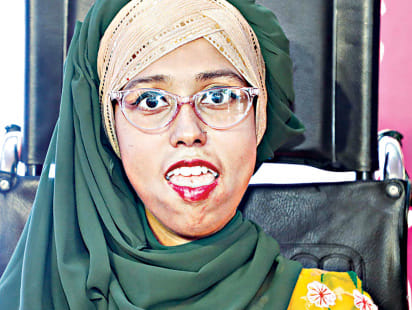
Zannatun Ferdous Mohua, Overcoming physical challenge to become a successful entrepreneur
Zannatul Ferdous Mohua, a physically challenged student has become a successful e-commerce entrepreneur. By exporting several hand-made embroidery products to foreign countries, Mohua, who is unable to walk, move her hands, or speak clearly, and can only move her fingers, is now selling her products online in over 18 countries and employs 35 women.
Her family suffered greatly as a result of her disability at birth, as society opined that Mohua would be a burden to her family. Despite all odds, Mohua managed to complete her graduation from the Azizul Haque College's English Department in 2019 and is currently pursuing her master's degree at the same institution.
When she was an HSC student in 2012, she learned some hand embroidery techniques from her aunt, who lived in the house where they used to live. She was thinking about some financial freedom at that time. Since she made the decision to start a business, it has not been an easy task. Through teaching, she had earned Tk 7,000 and started an online business by buying phones in 2018.
She has proved that autism is not a disability but rather being differently abled, and that they can contribute to society just like others.
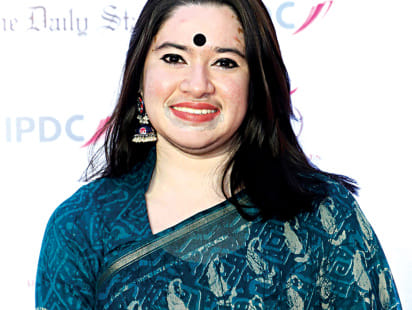
Taheatul Jannat,
Providing education free of cost for neglected children
In 2018, Taheatul Jannat started the free-of-cost school Hasimukh Pathshala with the neglected children of the sweeper community of Bandhab Palli at Faridpur Sadar Upazila. The school focuses on the mental development, moral education, cleanliness and proper care of children and adolescents in the sweeper community. At present 30 children are being taught at the school regularly.
To ensure proper hygiene facilities for women and girls during menstruation, a group of young people along with "Hasimukh Pathshala" and Taheatul Jannat have formed a voluntary organisation named "Nandita Suraksha." The organisation works on gender equality, women's empowerment, menstrual health hygiene, prevention of child marriage and dowry, prevention of sexual harassment, and mental health.
During the Covid-19 pandemic, Taheatul Jannat worked for the helpless destitute women and children in Faridpur. During the flood, in addition to food, she distributed sanitary napkins among poor women. In any crisis in her community, Taheatul Jannat came forward to stand beside the helpless people.
To stop violence against women and children, Taheatul Jannat creates awareness among children regarding safe and unsafe touch where she is trying to educate women about their legal rights. Also, her self-defence training for women in her district is quite well known in the community.
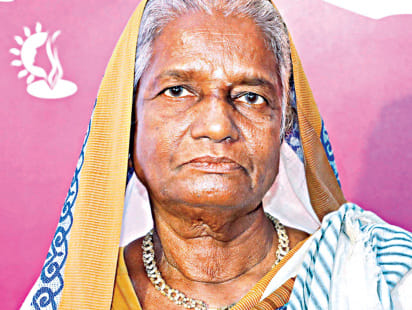
Shila Guha,
A Birangana who has fought day in day out
A brave woman who had endured torture during Bangladesh's War of Independence, Shila Guha's story of misfortune is as horrendous as that of other girls and women who had been taken to the Pakistan army camps. She survived that experience by a stroke of luck. However, her second round of tryst with fate began when her father refused to take her in after the war, as the Pakistanis had picked her up. Her life since then has been one of despair, denial, and betrayal even without any fault of her own. Even at this age, the trouble and harassment she is going through speak volumes about the negligence of society toward our poor, elderly individuals, and especially Biranganas.
Shila Guha finally saw a ray of hope when the honourable Prime Minister, in a video conference, reportedly assured her that she would be accorded due respect, and her days of misery would end soon as she, at last, finds the peace and recognition she deserves.
Women deserve respect despite such tragedies happening in their lives. This mindset of society needs to develop for women to live a peaceful and respectful life. Although recognised by the government, society still owes the same respect to Shila Guha.
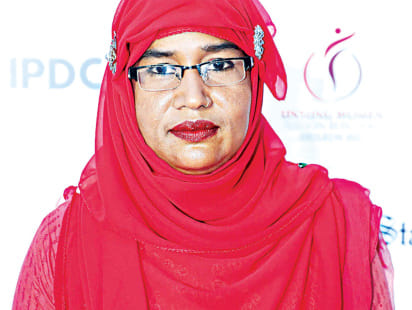
Jannatul Sarkar Champa,
An inspiring story of withstanding hardship through independence
Hailing from Pabna's Chatmohar upazila, Jannatul Sarkar had a very hard life at a very early age after her father's demise. In 2005, she got married and got divorced within a year, owing to her husband being a drug abuser. Once again, Champa was left stranded.
When she was selling newspapers, many people passed snide remarks at her for being a woman. In the beginning, she had no fixed customer and could barely sell five to seven newspapers a day. She never took the criticism to heart and continued doing her job with diligence. Now, she is earning Tk 500-550 a day selling newspapers, travelling 20-25 kilometres. People who had criticised her are now praising her.
In November 2021, she was elected as a female member in the reserved seat of wards 3, 4, and 5 of Parshodanga union.
"After serving her role as a newspaper hawker, she joined the Union Perished on time and performed her duty successfully. This is truly inspirational." Azhar said.
Unsung Women Nation Builders 2021
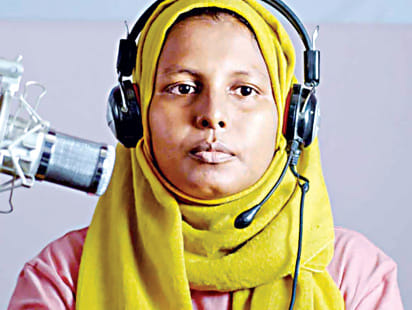
Sabina Yeasmin,
Englightening people about breast and cervical cancer in rural communities
Sabina Yeasmin has been spreading awareness about breast and cervical cancer in the rural communities, mostly in the south-eastern regions of Bangladesh, since 2017. Till now she has covered 33 districts and enlightened women from every social class and age group including women from schools, colleges, universities, garments, etc. She has already ensured proper breast and cervical cancer treatment for 310 women. The most unique part of Sabina's journey is that she went deep into the remote areas of these regions on a bicycle.
Sabina rode across the villages of Chattogram, Feni, Lakshmipur, Noakhali, Chandpur, and more, with her favourite companion, her bicycle, to raise awareness among the women of these communities about the causes behind breast and cervical cancer, the prominent symptoms, preventive measures and steps to be taken if someone experiences these symptoms. In Hatia, a remote island of the country, Sabina spread awareness to more than four lakh people through a local radio called "Shagor Dwip." As a woman, Sabina Yeasmin aspires to ensure proper awareness and treatment for every woman in Bangladesh.
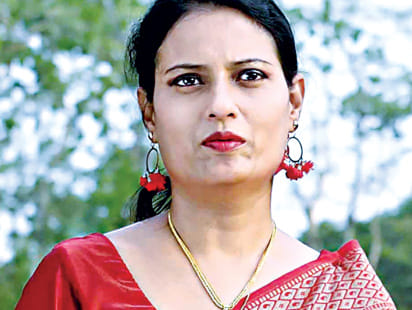
Farmis Akhter,
A selfless hero standing beside people during Covid
Farmis Akhter is a generous person who always tries to help people around her. Days after the first Covid-19 infection was detected, the country went into a nationwide shutdown. At around 11:30 at night on one of these lockdown days, Farmis was driving home after helping a blood donor in Sylhet city's Kazirbazar area, when she spotted a mentally handicapped man who fell sick. Some street children told her that the man had no food all day. Farmis rushed home, packed all the food she had cooked that night and returned to the spot. She fed the man by hand and shared the food with the street children too. On that day, she realised that people not only would die of the coronavirus, but some people would surely die of hunger.
That was just the beginning. Farmis withdrew all her savings from the bank and made it a routine to cook and distribute food among 250-300 distressed people in the city during lunch and dinner time till the shutdown was relaxed in June. She also gave grocery packets to 700 families in Sylhet city. Farmis's help reached the stray canines of the city too. Regarding her interest in helping people, Farmis said she attained these characteristics from her father, Abdul Mannan, who was a kind-hearted person. It has been her lifelong wish to help people in distress.
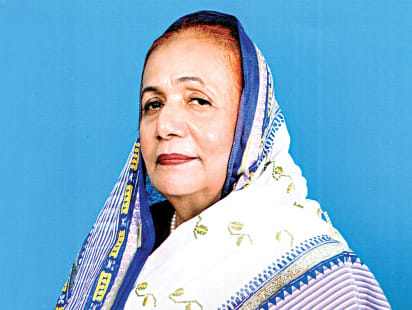
Jahanara Islam,
A self-made visionary entrepreneur
Jahanara Islam, the owner of Jahanara Green Agro at Cox's Bazar, is a self-made entrepreneur. She began her venture at a very early age after marriage. She started her journey with a cow and only Tk 4,400. With the profits she made from dairying, she opened a poultry farm with 100 broiler chickens with Tk 2,000 back in 1984. Then she moved on to operating a feed mill for chickens. With the profits from poultry and feed mill operations, she established 11 fish farms in Cox's Bazar. Then she ventured into the hatchery business with the help of BFRI.
She then became interested in home gardening which propelled her interest in tissue culture. Back in 1983, she observed that Buddhist monks treated algae-based foods as holy and they live a long life. She instantly made a connection between eating algae-based foods with a long life. She eventually formed an active collaboration with Sher-e-Bangla Agricultural University. To engage educated youths in order to create a bigger impact, she developed a network of university students who regularly sell her product and earn a fair margin to bear their expenses. So far, with all her activities and with direct and indirect supervision, she has changed the lives of more than 2 lakh people and has become a role model for many.
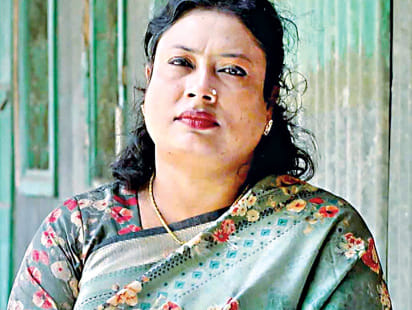
Fauzia Beethi,
A kind-hearted warrior standing beside underprivileged people
Everybody in Bogura's Dhunat upazila knows Fauzia Beethi for her philanthropic works. When Covid-19 hit Bangladesh, Beethi started making masks and produced 400 bottles of hand sanitisers. Beethi provided 18 kg of food packages to 350 poor families who lost their jobs during Covid-19. Last April and May, Beethi sacrificed two goats she and her children nurtured at home and distributed meat among 93 families.
Her early life was so miserable that no one thought that she would ever bounce back. Beethi got married in 1995, but her married life turned unstable within a short time. Her husband and in-laws started torturing her for dowry. They even locked her in a room to stop her from sitting for her HSC exam. Later, her family members rescued her and she got first division in her HSC. Next year, Beethi got admitted to Rajshahi University. Unfortunately, her husband also got admitted to the same university. In 1998, one day, her husband brutally beat her in the open campus demanding dowry. She divorced him and married Razzakul a year after the incident. This life lesson gave her the spirit to fight for oppressed women. On December 9, 2020, Bogura district administration recognised her as a Joyeeta considering how she bounced back in life and stood beside a thousand unprivileged people in their time of need.
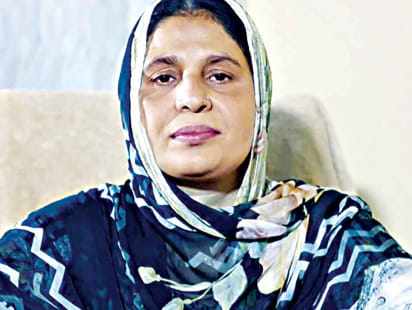
Rozina Akhter, Caring for the unfortunate till their last moment
Rozina Akhter, the elected member of ward number 7, 8, and 9, Enayetnagar Union, Narayanganj, has set an example of kindness during these tough times amidst the Covid-19 pandemic. After a certain period of time, the number of affected patients started decreasing in Narayanganj while the number of deaths was still increasing. At that time, people of the community faced a scarcity of manpower to wash the female dead bodies. And this is when Rozina stepped up.
With no prior experience, Rozina learned the method and came forward to help wash the bodies of the female victims of Covid-19. Till now, she has handled and washed 27 dead bodies prior to the latter's burial. Apart from this, Rozina has supervised the burial of 59 more people. Rozina even started travelling outside her designated union to help the other communities. Besides, she formed and is currently leading the group "Masdair Jubo Kallyan Shangha (MJKS) – Team Rozina Covid-19," which ensures proper burial for those who passed away from Covid-19.

Shapla Devi Tripura,
Saviour of the hill people
Shapla Devi Tripura is a dedicated social worker, who is loved by everyone in the Khagrachari Hill District. She has been working tirelessly for the development of society for over 25 years. In 2016, she founded Sampari (a social and charity organisation). The non-profit entity supports education, especially that of marginalised women and children, treatment of women victims of domestic and social violence and maternity expenses for needy women. She has been standing next to the meritorious and poor students in remote areas like a shadow of a banyan tree. Many of her students are working for the country by establishing themselves in various institutions.
Since Covid-19 hit the region, she has provided relief materials to many helpless people. She has distributed food items among more than 1,000 families in remote areas of Khagrachari. In 2018, Shapla was honoured as "Joyeeta" by Khagrachari district administration. She also received the Mother Teresa Memorial Award 2020 for her outstanding contribution to women's rights.
Unsung Women Nation Builders 2020
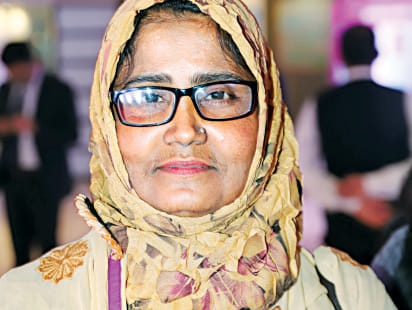
Momotaj Mohal Baby, A librarian enlightening a village
Momotaj Mohal Baby has been enlightening people of Dashiarchhara, a former Indian enclave in Kurigram's Phulbari upazila, through a library.
With a hope of doing good for her community, Momotaj established Golam Maola Alor Dishari Library with her limited resources in September 2015, a month after 162 enclaves were exchanged between Bangladesh and India.
Momotaj particularly wanted to develop reading habits among the girls and young women of Dashiarchhara as they were less exposed to the outside world.
She started collecting old books in 2009 and loaned those for free. After the enclave exchange, she inspired her husband Golam Maola to donate two decimals of land and later built a tin hut spending Tk 45,000 from their joint savings.
She said the library was named after her husband for his generous contribution of land and money.
Spending Tk 500-600, she buys at least two to three books every month and subscribes to a daily and a monthly newspaper for the library.
Momotaj, who currently works as a teacher at a mosque-based literacy programme run by the Islamic Foundation, also received Tk 29,000 in cash and books worth Tk 29,000 from the National Public Library in Dhaka in two instalments.
Her library now has a collection of 450 publications which includes novels, poetry, children's literature, travelogues, science fiction, religious books, and guidebooks for high school and college goers.
After completing her day job, Momotaj spends most of her afternoons at the library, which is open six days a week, except Fridays, from 4:00pm to 5:30pm.
Anyone can enter the library free of cost, read books, and newspapers there, and borrow one book for three days.
With the monthly salary of Tk 4,500 from her teaching job, Momotaj could not afford to keep up with library users' demand for new books.
Momotaj applied for library registration to the Kurigram District Public Library authority. Once the library is registered, she hopes to increase her collection of books.
Through the library, the visionary librarian looks forward to continuing her task of enlightening the young people, and especially women, of Dashiarchhara.

Kamrunnahar Munni, Using sports to prevent child marriage
Kamrunnahar Munni, an assistant teacher at a government primary school, is also manager of the district U-17 girls' football team. She works simultaneously for the physical and mental development of girls and to prevent child marriage.
Despite members facing social and family barriers and financial hardships, the Tangail girls' football team is moving forward, thanks to her dedication and intensive efforts.
Munni believes sports raise a girl's confidence level and makes her aware of her future. "Moreover, when a girl engages in sports after overcoming all these barriers, the people who have the mentality to marry children do not want to marry such an open-minded girl who has already got a taste of freedom," she said.
Munni first engaged with football when the school authorities gave her the responsibility of forming a girls' team to take part in the Bangamata Fazilatunnesa Mujib Football Tournament in 2011.
Later, after observing Munni's keen interest in football, Mokhlesur Rahman – then the additional deputy commissioner (education) in Tangail – requested her to take charge of the girls' school team that eventually became district champions in 2016.
Munni was afterwards made manager of the U-17 girls' football team in Tangail in 2017; the team went on to win the Jubo Games that year. Another Tangail team, also under Munni's guidance, became champions in the 2018 JFA U-14 Women's National Football Championship.
Most of the players come from poor families and many of their parents were initially reluctant to allow their daughters to play football.
Munni said she convinced the parents to allow their daughters to play, by assuring them that it will make their children physically and mentally strong. "And a mentally and physically strong girl can make a future on her own."
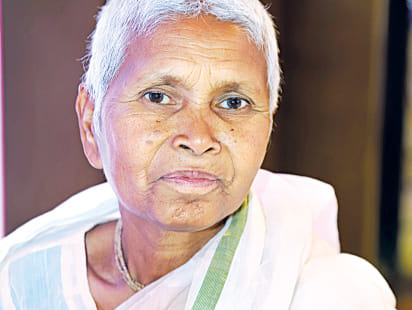
Tepri Rani, A tireless fighter fighting a never-ending war
Tepri Rani still remembers the torture of Pakistani occupation forces at an army camp for six months. She was refused by her husband after the country's independence in December 1971. She was rejected by her own society for 40 odd years.
In May 1971, Tepri was newlywed when the Pakistan occupation army picked her up from her home in Bolidwar village of Thakurgaon's Ranisankail upazila.
Using sheer willpower, she fought social stigma and raised her son.
But her struggle and sacrifice for the nation remained unrecognised until she was bestowed with the title Birangana in 2017.
The Thakurgaon deputy commissioner's office built a house for her that year. Since March 2018, the war heroine has been getting her freedom fighter allowance.
But the war crimes committed against Tepri still haunt her.
"They [the Pakistani occupation army] used to torture me if I did not act as per their will," says Tepri.
She has been suffering from hearing impairment due to the torture she was subjected to. She does not talk much these days.
The war heroine recalled that another phase of her struggle began once her husband refused to accept her back after the war. "There was no respect for me in society after returning from the Pakistani camp," she said bitterly.
On how she lived her life in those unbearable days, Tepri said, "After the death of my parents, I used to collect vegetables to feed my family. Later, I somehow managed a job at a local rice mill. I was paid Tk 5 per day in those days."
Tepri now mostly confines herself to a small room in her house.
Her son Sudhir said his mother gained some respect from the local community after the government's recognition.
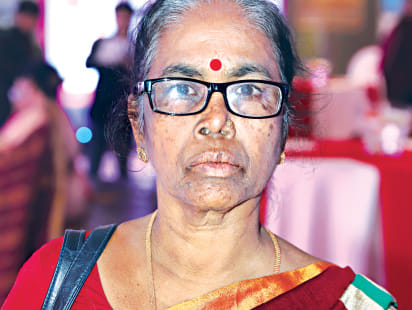
Biva Rani, A Birangana awaiting her due recognition
Biva Rani fell victim to the torture of Pakistani forces during the Liberation War when she was an eighth grader.
Despite applying for recognition of her sacrifice during the war around five years ago, her status is yet to be acknowledged.
Meanwhile, to run her family that includes her differently abled son only, she does odd jobs. Her husband, with whom she was married off a few months after the Liberation War, left her in 1988 when their son was born.
In 1971, Biva along with her five siblings were living at their native home. The Pakistani soldiers, local razakars and some other collaborators set their family shop on fire at a local market.
Her father, who was a small trader in Torki Bandar, tried to flee with his family to nearby Ramjanpur [Madaripur]. But they became separated.
Together with some other women, Biva took shelter in a sugarcane field. Unfortunately, local razakars found them and they were handed over to Pakistani soldiers. "We all became victims in that field," Biva says, weeping. "They tortured us and I lost consciousness."
When the army eventually left the area, Biva's father found her and brought her home.
Biva was married off to a local, Anukul Majumdar, not much more than two months later. Both families soon after started on the perilous and long journey by boat and on foot to reach India as refugees.
After liberation, they returned. When her son was born in 1988, Biva says he was "alright" but Sagor later suffered a head injury.
"We took him to the Barisal Sher-e-Bangla Medical College Hospital but due to incorrect treatment, the nerves and muscles in his feet, along with his brain, were affected. He became both physically and mentally disabled. Since my husband left, I have had to face the fight for our survival alone."
"I am old now," says Biva. "But I still have to care for my son. I had hoped to be recognised for the events that led to me being a victim of the Liberation War, so some years ago I filed an application online. Since then, I've heard nothing."
The local upazila committee has sent a recommendation for Biva's recognition as a freedom fighter to the central committee; a final decision is pending.
Biva still awaits her recognition.
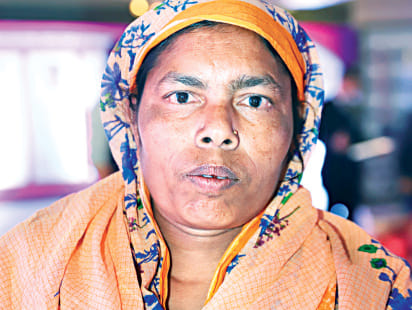
Laily Begum, Fisherwoman going against the tide
Laily Begum, Barishal division's first fisherwoman with a licence to catch hilsa, has been sailing on the Bishkhali river for the last 13 years.
She entered the traditionally male-dominated fishing industry out of necessity and gradually secured her place.
Laily's family, along with her neighbours at North Dalbhanga village at Dhalua union in Barguna Sadar upazila, never tasted prosperity because of continuous river erosion and other natural disasters. On top of that, cyclone Sidr hit the area in 2007.
A few months after the cyclone wrecked their village, Laily lost her father and elder brother to illness. Her younger brother got married and moved away with his family, leaving Laily and her sick and elderly mother.
Feeling completely at a loss, Laily then decided not to get married and vowed to take sole responsibility of her mother and herself.
For a woman like Laily, who had never gone to a school, work opportunities were limited.
She tried her hand at farming on their family land but that was not enough to cover their living costs.
This is when Laily turned to the Bishkhali.
She asked one of her relatives to take her fishing, but he ignored her and even chided her for making such a request. But she did not give up. She was steadfast in her objective, learned fishing, and slowly became adept at it.
Laily borrowed Tk 50,000 from a fish trader. She built a fishing trawler in association with a partner, bought nets and traps, and started fishing.
She spends about six to seven hours waiting for the tidal cycle while fishing in the river. Out in the sea, it is a six to seven days' task.
She said she was somewhat frightened during her first few fishing trips but her fellow fishermen gave her courage.
Now she earns between Tk 500-1,000 per day.

Sonu Rani Das, The first graduate among the Dalit community
She is one such woman who despite all the odds, achieved the distinction of being the first graduate among the Dalit community living in the sweeper colony of Tanbazar in Narayanganj.
She got married at an early age. But she was lucky to have a supportive and understanding life-partner who always stood by her.
After completing her BBA, Sonu has now gotten admitted to a master's programme.
"I was brought up in an environment where people are marginalised to the extreme partly by religious sanctions and partly by social and economic deprivations," she says.
According to Sonu, language is a barrier as they communicate mainly in Hindi whereas the academic curriculum is in Bangla. She says many are held back by language. Other problems facing the Dalit community include, of course, child marriage.
Sonu, an icon amongst women of the community, wishes to work on raising awareness to overcome these barriers. Children in the community are now following in her footsteps.
Along with studying, Sonu works in Bangladesh Dalit and Excluded Rights Movement (BDERM) and in a project under the Narayanganj City Corporation to improve women and children's health.
As part of the recognition of her struggles and achievements, Sonu got the opportunity to participate in various international programmes in Scotland, Switzerland, and Brazil.
Being an inspiration to others who came from underprivileged backgrounds, Sonu has the confidence and courage to move ahead. She has created history in being the first graduate in her community, and she believes that she can bring about many more positive changes.
Sonu dreams of diminishing the problems she faced while growing up – so that her children and future generations do not suffer in the same way.

Kohinoor Begum, A social leader of poor villagers
Borangile village lies on the char land of the Jamuna basin; villagers are mostly dependent on finding work as day labourers to survive. They are able to grow some crops when the water in the river recedes and the char lands are exposed.
Situated around 100 kilometres from Sirajganj town, Borangile often falls out of the purview of government amenities or relief, even though its people are among those critically affected by flood and other natural disasters.
Early in 2018, a few women including Kohinoor Begum, going to collect relief materials from the local government, had to walk a distance which took a couple of hours by foot.
They were turned away as relatives of the local member-chairman had got the relief items instead of them. At least 3,000 families in her union were gravely affected by the floods that year.
Taking matters into her own hands, Kohinoor called a meeting in her village – gathering around 40 women to help set up a community food bank for times of need.
The community is itself poor, but there are some who are needier than the others, Kohinoor said. "We should do something for them. During hard times, any member can take rice from our bank."
Set up in 2018, the food bank is independent of government support. "We are trying to gather financial support from other villagers as donations," she said.
The food bank also works as a crisis fund for the poor – used to meet wedding expenses of poor families, treatment costs, and educational costs.
Members of this food bank also started setting aside whatever little they could manage. It now has 48 members and their savings have crossed Tk 40,000.
The initiative and its founder are now a source of inspiration for neighbouring villages.
Kohinoor has suffered extreme poverty since childhood.
She is now mother to four daughters and three sons. To feed their children, she and her husband worked together as house maid and day labourer in their neighbours' houses.
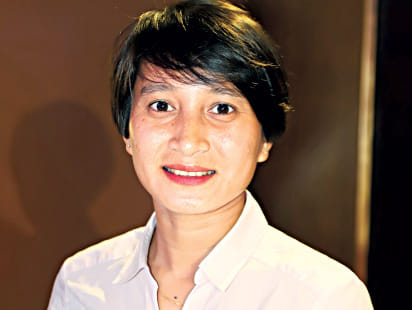
Joya Chakma, A revolutionary figure in football
While other girls ran after university degrees, "better" careers, and a secure future, a girl hailing from the hill district Rangamati devoted herself to football.
Her struggles, devotion, and hard work have afforded her the privilege of being the country's first female international referee recognised by FIFA, the world football governing body.
Joya Chakma is the only Bangladeshi among five FIFA-enlisted female international referees in South Asia.
As a child, Joya used to compete in sports and run races in her childhood, but loved football the most.
Her outstanding performance in an inter-district football tournament in Dhaka, where Rangamati won, earned her a call up to play in the women's national football team. She went on to play in various national and international tournaments including the SA Games in 2010.
Joya then got admitted to the history department at Jahangirnagar University. But she was already garnering hopes of being a football referee.
"I was in a dilemma about whether I should start studying for a job or work towards building a career in football," said Joya.
She then decided to sit for an examination for referring.
Her career as a football referee started in 2012 through the Bangamata football tournament. Joya went on to referee matches in football tournaments in Sri Lanka, Nepal, and Tajikistan. In 2015, Joya refereed 10 football matches in an international football tournament in Berlin, Germany.
Joya joined Bangladesh Krira Shikkha Protisthan (BKSP) as coach; under her guidance, the BKSP women's football team became champions in the "Subroto Mukherjee Gold Cup" tournament in India where she also received the "best coach" award.
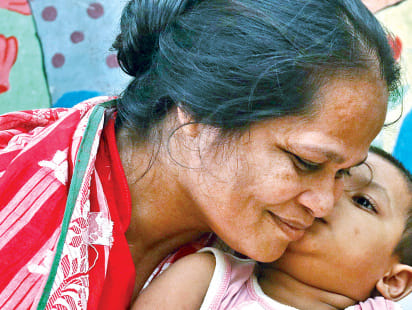
Hazera Begum, A mother of underprivileged children
Hazera Begum's childhood was marred by three things – misery, neglect, and struggle. But she turned all those into driving forces and became the "amma" of 40 underprivileged children.
Most of these children biologically belong to sex workers but Hazera, who herself was a sex worker until the age of 23, is nurturing them like a mother at a childcare centre in the capital.
Hazera left home at the age of eight to escape from the torture unleashed by her step-mother. Initially, she lived on the streets but later got forced into prostitution. But the motherly soul deep inside her made her say goodbye to the profession and start afresh.
Hazera runs "Shishuder Jonno Amra", a childcare centre at Dhaka's Adabor neighbourhood. The 40 children living there attend nearby schools, eat, and play – all in a safe, homely environment.
Hazera had opened the centre with her savings. She had worked for a development organisation for some time after giving up sex work. Individual donors help her run the centre.
Hazera said she came up with the idea of establishing such a centre out of concern for sex workers' children who have "no identity, rights or future." She feels no less than a mother when she takes care of the children most of whom have been abandoned by their families.
"These kids are my family. I am embracing motherhood with these children," she said.
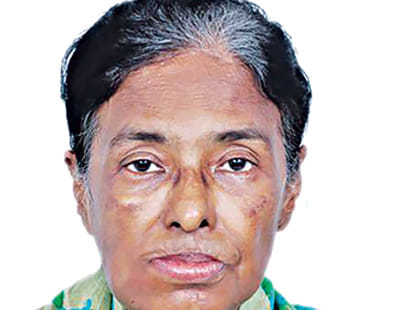
Khurshid Jahan, The Tigress of Sundarbans
Khurshid Jahan lived an ordinary life in Khulna before she died on February 19. But she is an image of strength and independence to her grandchildren, who grew up listening to tales of how she fought for the freedom of Bangladesh.
Khurshid was a college student and mother of a five-month-old baby when she joined the Liberation War of 1971.
"I was recruited to scrutinise new comers and arrange training for them, especially women," she said in an interview with The Daily Star.
The then 21-year-old mother wanted to be in the frontline, but her commander persuaded her to oversee the nursing of injured freedom fighters and training of new fighters.
She would hop on boats to any of the 14 camps in the forest to treat injured fighters, give logistical support, and even spy on them to see if any of them was a traitor.
Khurshid lived a very active life as a banker and then with her family after retirement. She died of oral cancer at the age of 69. She would take her grandchildren – Ruffin Saswan Zaman and Wriddho Jyotirmoy Zaman to the village, to swim and spend time with them. She liked to live with all her family members together, which is why her family still lives in a joint family, says her son Asaduzzaman Taj.
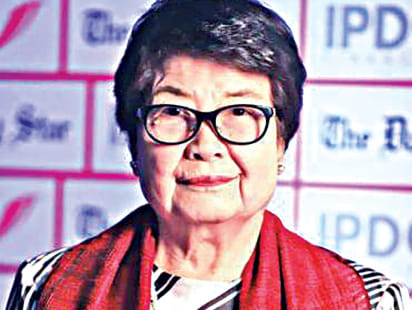
Hiroko Kobayashi, From Japan with love
Japanese national Hiroko Kobayashi is a teacher of Ikebana, the Japanese art of flower arrangement, and a photographer. But these are not the skills she is well known for in Bangladesh. Rather, it is for the generosity she demonstrated towards advancing women's education.
From her own initiatives, she has financially supported over 100 Bangladeshi girls to complete their school and college degrees in Jhenidah and Panchagarh.
It all began in 2003, when Hiroko first came to Bangladesh to work for Japanese NGO Hunger Free World and heard that a female student in Kaliganj of Jhenidah had died by suicide allegedly for not having enough money to appear in her Higher School Certificate exam.
Hiroko, who herself faced financial challenges growing up, decided to stand beside the poor female students. The only condition she places on the scholarship recipients is that they promise not to marry until they are well-established. She also hopes that they will, in turn, help other poor students in future.
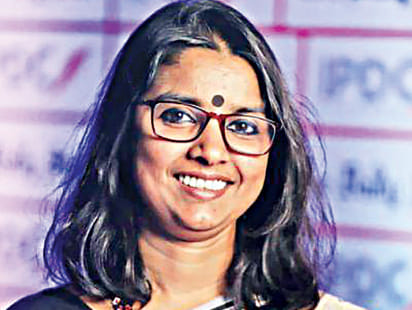
Rupa Datta, Championing a school rebuild
Rupa Dutta got an opportunity to visit the remote parts of Bandarban while working for an international organisation in Chattogram in 2013. There, she discovered a school at Champajhiri Para in Gajaliya union of Lama.
It made her sad to see that the school had only one teacher, whose monthly salary was Tk 1,500. While the salary was paid by a missionary, the teacher had to work on a farm to make ends meet and could not concentrate on teaching the 11 students at the school.
Rupa decided then and there to contribute to the teacher's salary and expand the school. "I approached my friends Miti, Rajib, Rana, and Sanjay to join me in serving the indigenous communities."
They agreed and the venture for the Mro children started.
They named the school Pawmang (flower garden) and eventually helped its renovation. They also set up a hostel in 2015 with contributions from friends. The village chief Long Tui donated five acres as well.
Different organisations including Colouring Little's Mind, Vertical Dreamers, and Crack Platoon contributed to the school that now has 103 students from pre-primary to Class-V. Rupa said there is a committee comprised of locals, guardians, and teachers to manage the school. "We are advisers and want the committee to take the leadership role."
A total of 21 students who graduated from the school are now in high schools.
Sanjay Kumar Nath said they rented a hostel in Bandarban town for the high-school students.
"We have started gardening, tree plantation, and fish farming to make the school self-reliant," he said.
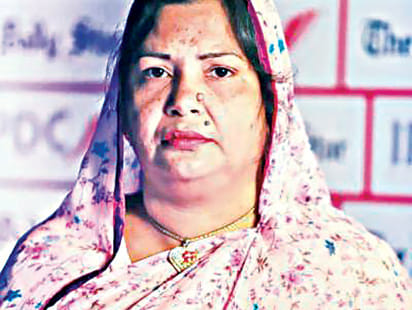
Bilkis Banu,
Caring for the uncared for
Bilkis Banu could have spent a life of luxury with what she and her in-laws had. Instead, she chose something bigger – to serve children who had no one to look after them.
Inspired by the services of Mother Teresa towards the poor and abandoned, she established an orphanage – Golap Kha Shishu Sadan in Nageshwari upazila of Kurigram – on a piece of land owned by her husband's family. It is now home to 75 children.
Bilkis has always been passionate about helping out children in need. She used to take care of five orphans at her home as well as providing free tuition to poor children in her neighbourhood. She was especially moved in the winter of 1999 when a mentally challenged woman came to her with a baby girl, failing to take care of the child.
Bilkis took her in and named her Pritilata.
That night, she dreamt about Mother Teresa. It was then that she and her husband Rabiul Islam decided to build an orphanage.
Bilkis provides the orphans with formal education, while they also take part in physical exercise and cultural events at the establishment.
The orphanage is funded by the earnings of the family, farmland, a hostel, and some private donors. Bilkis has future plans to construct a new orphanage complex on 2.25 acres of her family land.
"I will do everything needed to fulfil the wishes of the children in whatever field of study they choose… My aim is to raise these children as good human beings," says Bilkis, who herself could not study beyond the higher secondary school level.
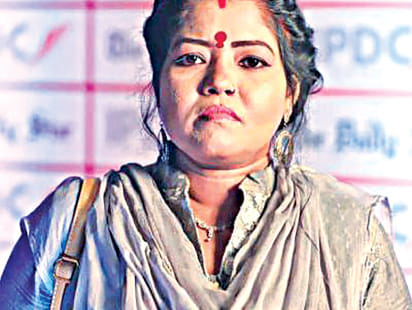
Chhobi Das Gupta, From worker to entrepreneur through hard work
Poverty had forced Chhobi Das Gupta to drop out of school before completing the secondary level but her indomitable spirit and hard work made her an entrepreneur from a garment worker.
After the death of her father about 20 years ago, Chhobi started working at a garment factory when she was only 12. Though she had to support her family of seven members, she did dream of pursuing education further and become an entrepreneur one day.
She got herself admitted to the Bangladesh Open University but once again had to pause due to financial distress. This time, however, she had her target fixed in mind and thus kept on saving money accordingly.
After 18 long years, Chhobi established her factory "Sense Fashion" in Chattogram early in 2016. Initially she had six workers, 10 sewing machines, and a capital of Tk 7 lakh – Tk 5 lakh in savings and the rest from loans. With skills and hard work, Chhobi expanded the business and today has 60 sewing machines and more than 100 employees working for her company.
"There was a time when I had to wait for salary every month to feed my family. Today, I disburse Tk 6 lakh as monthly salaries to my workers."
Chhobi is grateful to her husband Amalendu Das Gupta and his friend Dipankar Dastidar who stood by her during the rainy days. "Without their support, I would not have reached this stage," she said.
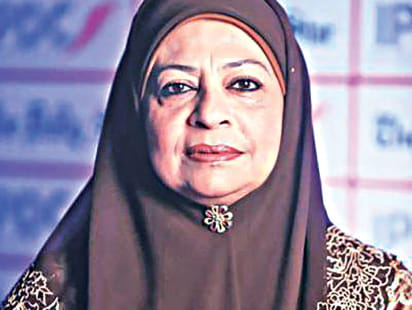
Salma Choudhury, Dedicating her life to children with cancer
Salma Choudhury has seen the worst of cancer as she lost her son Ashiq Husain Choudhury to the disease in May 1993 in London. The boy was three years, three months and three days old.
But instead of drowning into sadness, she felt for other mothers going through similar situation, and hence founded "A Shelter for Helpless Ill Children" (ASHIC), Bangladesh's first NGO dedicated to children with cancer.
Founded in 1994, the charity aims to support children fighting with cancer and their parents with love, compassion, and empathy. Salma and her husband Afzal Husain Choudhury donated their familial property to set up a shelter at Dhaka's Bangla Motor and a palliative care unit in Dhanmondi.
The foundation also runs four play centres at paediatric units at the Dhaka Medical College Hospital, Bangabandhu Sheikh Mujib Medical University Hospital, Sylhet MAG Osmani Medical College Hospital, and Chittagong Medical College Hospital.
The shelter accommodates children along with their parents for free when they come from outside Dhaka for treatment. The palliative care unit gives comfort to the terminally ill patients.
Salma says her heart leaps with joy when children, with support from ASHIC, continue the lengthy treatment process and finally recover.
"I have suffered a lot and I know other mothers who are in the same situation. I am happy to see children surviving cancer," she told this paper.
Unsung Women Nation Builders 2018

Lucy Helen Frances Holt, A humanitarian worker who belongs to this land
Catholic Sister Lucy Helen Frances Holt left her home in Britain in 1960 to pursue humanitarian work in the-then East Pakistan. Little could she have known that through war and peace, Bangladesh is the country that would win her heart.
"I worked as an orderly at the Fatema Hospital in Jessore during the Liberation War," recalls Sister Lucy, who even attended civilian and freedom fighter patients on days when the hospital's doctors deemed it too risky to leave their homes. On occasion she treated bullet wounds.
She was asked to leave in 1971 for her own safety but refused. "I wanted to stand beside the freedom-loving people of the delta," she says. "I was really fortunate to be able to contribute to the country's liberation."
Sister Lucy wrote to contacts in Britain to plead the cause of an independent Bangladesh, in support of Sheikh Mujibur Rahman Bangabandhu whom she greatly admired.
Sister Lucy is still engaged in social work and teaches English for free at the Barisal Oxford Mission Primary School. In February 2018 the Bangladesh government granted her final wish: to be a Bangladeshi citizen so that she can forever remain in the land she loves.
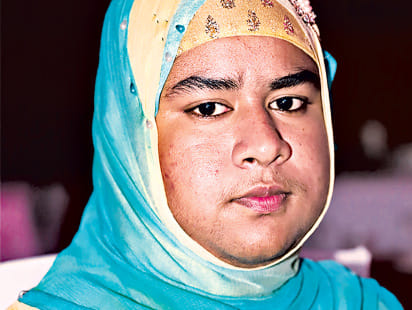
Arifa Akhter, An indomitable spirit that overcame immeasurable challenges
When Arifa Akhter sat for her Secondary School Certificate exam in 2016, she didn't sit on the bench like other children. She sat on the table and wrote with her foot. Determined Arifa was born without the ability to use her arms.
According to classmates at Fulgachh High School in Lalmonirhat, although Arifa takes a little longer to write her answers with the pen held between her toes, the script is neater than what they can manage with both hands.
"Arifa was always interested in study," says her mother Mamtaz Begum. "She keeps busy with that. I help her to bathe, eat, and dress. Everything else she does herself."
"I've never been able to provide the support she needs for her studies," says her father Abdul Ali who works as a labourer. "But she never asks for anything."
Forging her own path in a world that struggles to cater for children like her, Arifa has persisted and excelled. The most outstanding student at her primary school, she scored an unbeatable GPA 5 in her Junior School Certificate. In her Secondary School Certificate, she achieved a GPA of 4.84. As for the future, Arifa dreams to be a lawyer.

Naznin Akhter Nipa, From the roots inspiring others
Since the dawn of time, human societies have gathered knowledge of plants that heal. Much of that knowledge risks being forgotten. Some crucial species face extinction. Almost 20 years ago in Khulna's Katianangla village, Naznin Akhter Nipa established a garden that specialises in preserving and promoting herbal disease prevention and cure.
As it is with many good ideas, the garden was born of a crisis. Nipa was busy as a housewife then, caring for her two children. Her husband was a fisherman and the struggling family's sole breadwinner. When pirates attacked his trawler and stole his fishing nets, the future seemed lost.
On advice from a non-government organisation, Nipa decided to start a plant nursery. But she wasn't satisfied. "General nurseries are common," she says. "I wanted to do something outstanding."
In 2000, she decided to specialise in medicinal plants. The couple began to seek rare plants, with her husband travelling as far as India to purchase specimens. Over time, Nipa collected 81 books on the subject. "I hoped to increase community knowledge about the medicinal properties of plants," she says.
Nowadays her garden features 50,000 plants from 2,000 species. Patients routinely ask her advice. She has inspired other village women to start their own gardens.
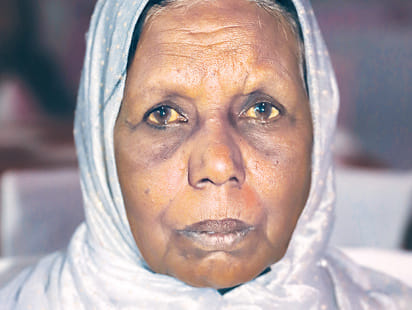
Safia Begum, A librarian who lit up the darkness
In the slums of Narayanganj is the unlikely "Shapla Pataghar," a library founded and run by widow Safia Begum. With the motto "Reading books enlightens, not reading them leads to darkness," Safia established the library in 1990. She is intent on spreading knowledge in her disadvantaged community.
Born into poverty, Safia was married off when she was in class eight. She settled in Fatullah with her husband, and just when the weight of life's struggle appeared to be lessening, tragedy struck. In 1988 her husband died, leaving her with six children to care for.
She took a job in a towel factory. Her children were compelled to leave school in favour of employment. Two years later Safia attended a "mass education" training programme at the directorate of children and women affairs. Then she started to teach several batches of up to 120 students each, in the slum.
"Not all of them could afford materials so I began to collect books," she recalls. "I also bought books on topics like the Liberation War, novels and story books."
Thus began her library. It currently has a collection of 500 books, most of which Safia bought from her own pocket. It is housed in the tin shed that also serves as her home. The library achieved government registration in 2012. For many of its patrons, it's their only chance to read books.
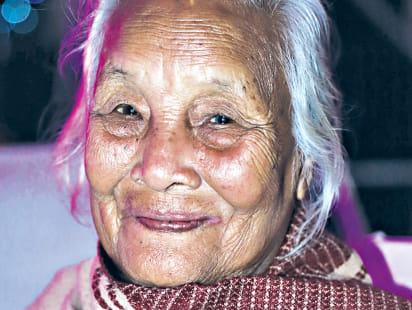
Protibha Sangma, A champion of education
When Protibha Sangma was born in a Garo village beside Tangail's Madhupur forest, wild animals were common. Education was not. Thanks to her culturally-minded mother Protibha was enrolled in school. Thus began a lifelong journey dedicated to knowledge. In her community, many regard Protibha as education's pioneer.
By class eight Protibha was studying in Mymensingh, supporting herself by working as a tutor. She hesitated to visit home as she was concerned her father might arrange her marriage in which case her education would end.
Protibha began her working life as a teacher in Mymensingh and Netrakona. In 1965 she returned to Madhupur. "I went from house to house to motivate mothers to send their children to school."
In those days many children didn't attend school because they had no suitable clothes. A pant-and-shirt set cost one taka. Protibha bought as many clothes as she could. She also offered advice on infant health. "I enquired after babies, whether they were being breast-fed, to promote nutrition," she says.
On the cultural front Protibha was likewise active. "I advised young people not to forget their roots. We may be Christian but we are also Garo. It's a matter of pride."
After the Liberation War, Protibha took a leading role in establishing Madhupur Girls' High School, where she worked for the next two decades, until she retired.
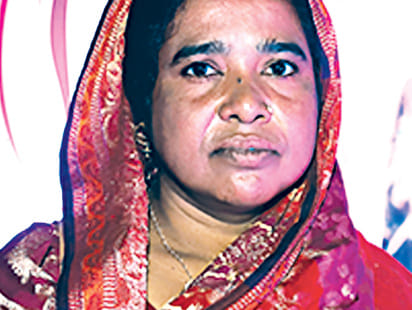
Aklima Begum, An entrepreneur and asset for her community
Distant Malmolia village in Khulna doesn't have sealed roads or grid electricity. It does have a well-stocked agricultural supply store, belonging to self-made businesswoman Aklima Begum. Over the past decade, she transformed the circumstances of her once-struggling family.
"People used to ignore me for my poverty," recalls Aklima, who used to work as a day labourer. In 2007 she decided to improve her lot by mortgaging 50 decimals of family land for Tk 80,000 to start her business. She took accounting training from a non-government organisation and her enterprise began to flourish.
Now her shop has a turnover of around Tk 17 lakhs per month from which she draws a salary of Tk 35,000. She has diversified beyond agricultural products to offer services such as mobile banking. Once forced to sell all the fish from her household ponds she is grateful to be in a position to cook some at home.
"Due to poverty and helplessness I had to give my only daughter for marriage at a young age, which is what happened to me," she says. "Now I am more fortunate. I am determined to see my son complete his education."
Aklima has become a community asset for farmers who often ask her advice. She is an inspiration to other women. "I'm really proud of her," says her husband Abdul Halim Sheikh. "She brought such positive change to our lives."
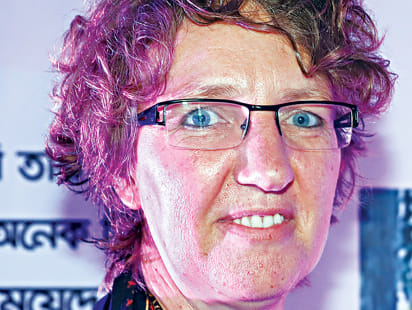
Antoinette Termoshuizen, Treating children with care and love
For 20 years Antoinette Termoshuizen, originally from the Netherlands, has provided therapy to Bangladeshi children with disabilities. She runs the Niketan Foundation, a charity she founded in 1998 that operates two centres in Dhaka and Manikganj which are home to more than 500 children.
In 1992 Antoinette was feeling dissatisfied with her job in the Netherlands and decided to take her bicycle to Indonesia and ride back to Europe. The epic journey brought her to Bangladesh for the first time.
Antoinette returned home but couldn't forget a promise to help Sayeed. She tried to raise funds but many people said they could only contribute if she personally returned to ensure Sayeed benefited. So, she did.
Initially, many people thought Antoinette could give an injection or special medicine to heal their children. "I had to convince them I could help the children heal and flourish to some degree through games and therapies," she says.
In 1995 after being attacked by a schizophrenic man, Antoinette herself became paralysed. She underwent treatment in the Netherlands before returning. She looks upon that traumatic experience with positivity. "I think God gave me that experience to better understand the feelings of my children," she says.
Antoinette, commonly known as "Khalamma" or "Aunty" in the community, considers Bangladesh her home.
Unsung Women Nation Builders 2017

Bhagya Rani Banik,
Woman of green
When she became the director general of Bangladesh Rice Research Institute (BRRI) in June 2016, Bhagya Rani Banik was the first woman to hold that post.
She graduated from Sher-e-Bangla Agricultural University and joined Bangladesh Agricultural Research Institute (BARI) in 1983. Ms Banik earned her PhD from Bangabandhu Sheikh Mujibur Rahman Agriculture University in 2003. She has significant contribution in food sufficiency and climate change research.
Under her leadership BRRI has achieved international success. She has contributed in developing better breed of corn. She has 37 research articles published in national and international scientific journals.
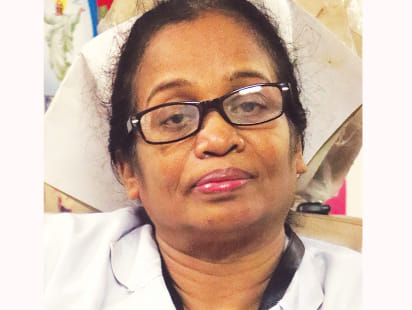
Irani Baroi, An indomitable soul on a mission to help the sick
Even though her legs became paralysed, Irani Baroi did not give up her mission of helping the sick. Irani is a senior nurse today at the 100-bed general hospital in Madaripur.
She earned her diploma in Nursing from Dhaka Medical College and Hospital in 1986 and started her career in Madaripur General Hospital. She came down with fever in 1996 and her hands and legs became paralysed. Therapy brought back the use of her hands but her legs did not improve.
Despite being paralysed, she is by no means inferior to any other nurse in her hospital, her patients, superiors, and co-workers testify to that. She believes as long as she can use her hands, she can continue to help her patients in every way possible.
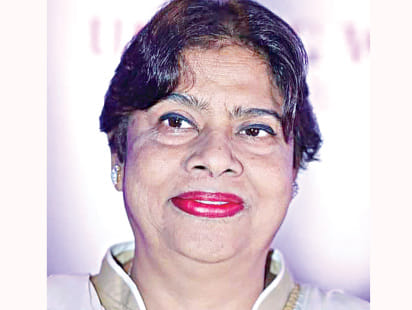
Fatema Begum, The first female police officer
First woman police officer and additional inspector general of police, Fatema Begum is one of the first two women who chose to join the police service after their Bangladesh Civil Service (BCS) exam in 1984.
The other quit soon after, but she continues to serve in the police and became the first woman to become an additional inspector general of police.
"Firm in their belief that the police force was no place for women, they tried to make us leave from the very first day – beginning with barring our entry at the orientation for new officers," says Fatema. She was forced by her bosses to write to the home ministry asking it to give her a posting in some other cadre service.
After the training was over, the male officers were ordered to pack and go to the Police Academy. But there was no instruction for Fatema. She waited and waited, but no orders came. A couple of days later, she wrote to the Police Headquarters saying she would not give up her job and that she would rather wait further. She was allowed to go to the academy after she persisted.
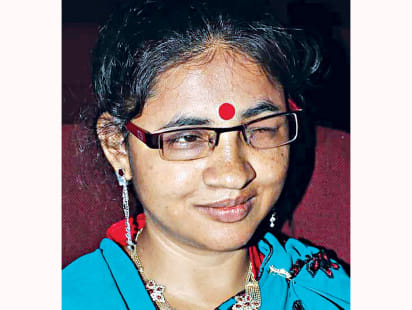
Rokeya Begum, Blindness
no bar to teaching
Rokeya Begum, who became blind at the age of 3, is an assistant teacher of Tambulkhana govt primary school. Her indomitable spirit has brought her to this position. She teaches like any regular teacher. Moreover, she is a popular teacher.
She had to struggle to be here today. Her father Sheikh Mujibor Rahaman died leaving five daughters and one son. Three of the sisters are also blind. When her mother also died after a few years, their elder sister Sahanaj Begum took them in.
Now Rokeya's two blind sisters are in university. Shekha Begum is a student of MA in the Department of Social Science at Eden Mohila College Dhaka. Ashia Akter is a student of BA in the Department of History at Dhaka University.
"She is a really good teacher and also a good person," said Kakoli Saha headmaster of Tambulkhana Government Primary School. "She is meritorious and she has an indomitable spirit."
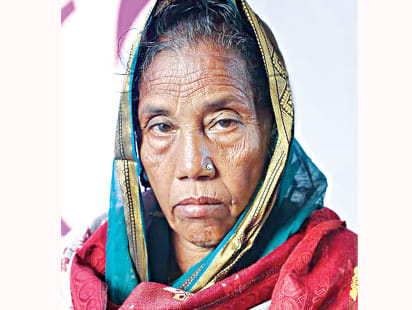
Sonajan Akter,
The selfless midwife
Sonajan Akter of Chowbaria at Manikganj has been serving as a midwife for the entire village as well as at least 15 other villages for the past 50 years. She does not accept any payment for her services despite her family being extremely poor.
She takes care of the mothers, and later, their babies, for up to 10 days after birth. Relatives and acquaintances testify she looks after the mothers and children just as a grandmother would – with utmost care and affection.
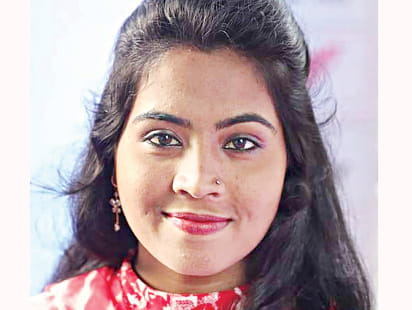
Shahida Akhter Shorna, Malala of Bangla
For her work against child marriage, Shahida Akhter Shorna was dubbed the "Malala of Bangla" by Norwegian Prime Minister Erna Solberg at an international conference of Plan International, an organisation that works for children's rights worldwide.
Shorna endured pressure for early marriage like all the other girls in her village. Her elder sisters, all four of them, had given in without a protest when their time came. But Shorna did not. She was adamant that completing her education was her first priority.
It was her wholehearted campaign for girls' education in her village that put her on par with Malala Yousafzai. Although there were no gun-toting Taliban insurgents patrolling her village, hers was no less challenging a task than Malala's.
President of Gazipur's Mawna Union Shishu Forum of Plan Bangladesh, where she joined in 2006, Shorna is now a marriage-buster in her community and also an icon. She has stopped six child marriages in her union so far.
Shorna always took it upon herself to organise students for different events. She showed her leadership quality during those programmes. Shorna, who once wanted to be a doctor, now wants to serve the society by becoming a university or college teacher.
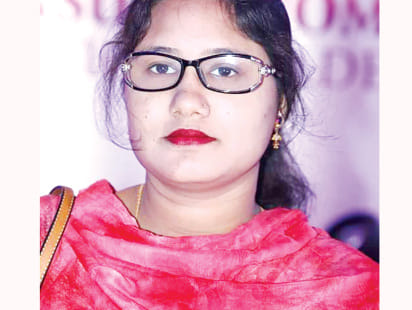
Maftahul Jannat Likhon,
The light of Joypurhat
Because Maftahul Jannat Likhon decided to install solar panels free of charge in three villages two years back, students from the poorest families can now study at night in these villages of Joypurhat's Panchbibi upazila.
When many people would leave empty handed from her solar power sales centre because of the high price, she started to feel the problems children faced in those families. She felt children from the poorest of families should have a fair chance to go to school and having bright lights to study at night could boost their morale.
Nowadays, the three villages are collectively called "Solargram" and 148 families have solar lights because Likhan felt that she had to do something to help.
But bright lights are not enough. One also needs books. In March this year, Likhan visited her Solargram with bundles of children's books to be distributed for free. From solar lights to light of knowledge, Likhan has them all.



 For all latest news, follow The Daily Star's Google News channel.
For all latest news, follow The Daily Star's Google News channel.
Comments